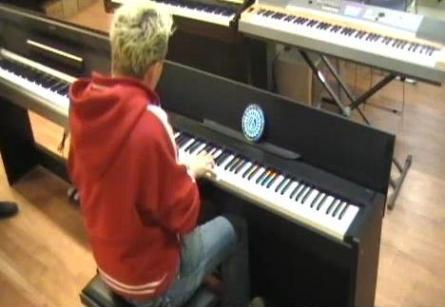
Keyboard instruments nowadays are more compact, come loaded with features, and integration with technology is much more. Various factors to consider before buying a music keyboard or digital piano are cost, your skill-levels, what do you want to use it for, overall musical objectives and things such as number of keys, key action, various built-in features.
.Introduction
Modern digital piano keyboards come with lots of features, effects, musical styles, sounds, editing and creation possibilities, etc. These are also available in varied looks: simple portable looks as well as designs that make them look like a real piano (uprights and grands) with authentic weighted/graded hammer action keys.
Digital Pianos today combine the features of electronic keyboards as well as acoustic pianos, and it’s common to find several varieties of “88 keys digital pianos” (portable/stage pianos).
Related: Practical advantages of digital pianos (over acoustic ones).
Though most Digital Pianos nowadays come with features found on arranger music keyboards, a lot of people actually prefer the piano to have beautiful piano sounds and authentic piano keys. All the other features are “nice-to-have” features and not absolutely necessary for them.
On the other hand, there are players who want the best of both the worlds (they want everything in their piano).
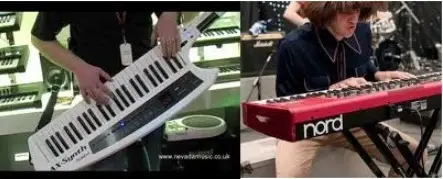
Here we take a closer look at the various factors that you need to consider before buying a keyboard instrument. Though I have listed the factors separately for digital pianos and portable keyboards, there are many factors that now apply to both.
Factors to Consider for Digital Pianos
Types of Pianos (and Keyboards)
If you have been playing the keyboard (61-keys) for some time, eventually you may have to get a nice piano with 88-keys to further your piano learning.
Today, you will find digital pianos in the traditional format (that looks like their acoustic counterparts) and even in compact versions that are suited to most homes nowadays (you get separate matching stands for such compact pianos that make it look like a vertical piano).
Read more on the various types of pianos.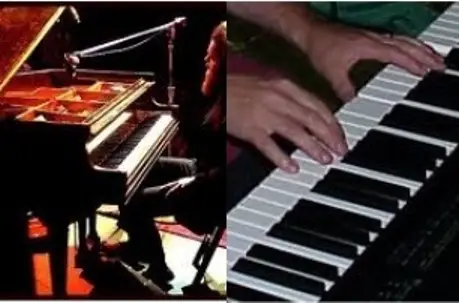 The more notable differences between portable keyboards and digital pianos are size, number of keys, type of touch, features, and cost.
The more notable differences between portable keyboards and digital pianos are size, number of keys, type of touch, features, and cost.
- Portable keyboards are lightweight, have about 61 keys or lesser, can be packed in a gig bag and carried around, and are suited for learning.
- Digital pianos have 76/88 keys, have weighted keys (semi-weighted options are also available). It may look portable (minus the cabinet) but its still heavy. Though musicians who play the piano don’t mind lugging around a 88-key digital piano to gigs.
You also have the option of choosing the best of all the worlds, a product with fully-weighted piano like keys, combined with a wide range of features (voices, styles, etc.)
Related: Detailed guide on Music Keyboards and Digital Pianos
Does Look Matter to You?
There is no doubt that top end pianos have majestic looks. It adds to the beauty, decor and aesthetics of your room and it does complement the various props and furniture that your room has.
for many buyers, the aesthetics of the piano matters. So, you need to ask whether you need a piano with the classic design for your home.
If you prefer your digital piano to look like a real one, then you may opt for a home digital piano (with wooden cabinet). You may choose an upright or even baby grand piano. You can choose from a variety of colors (finish).
For some people, the piano is not just a musical instrument, its also an important prop/furniture in their living room. It adds to the aesthetics of your house and often a talking point for any guests.
How is the Keyboard Action
Keyboard instruments can have different kids of key actions – synth action, semi-weighted, weighted, hammer and graded hammer action.
Most electronic keyboards and synths come with a synth action (non-weighted), which makes it easier to play as the keys are lighter…Ideal for beginners and non-pianists.
Weighted action tries to imitate a real piano key; weights are added to the keys to make them harder to play, making it suitable for piano players.
The top digital pianos come with graded weighted or graded hammer action giving it a very authentic feel. The keys tend to be heavier on the bass side and lighter on the right side which is how an acoustic grand piano behaves.
The top digital piano models even use wooden keys to closely resemble the keys on a real acoustic piano.
Various piano actions explained.
You should avoid synth and semi-weighted actions if you are serious about piano playing. The best digital pianos use Graded Hammer action as it emulates the action of a grand piano (but it will cost you more).
Serious piano players need a piano with authentic keys/action; ideally fully weighted, graded hammer action.
Feel free to try out various pianos and ask questions like:
- Does it really feel like real piano keys…or may be as close as possible?
- How is the resistance of the keys? Does it feel too light or heavy?
Please note that some entry-level pianos may have a slightly softer feel. Most digital pianos also let you adjust the key touch.
Sounds and Styles
You get hundreds of musical styles and sounds on digital/electronic keyboards.
So after you know a few songs, you can play them with a variety of musical styles, ranging from classical to modern. You should be able to impress a lot of people with these styles and sounds.
These keyboards will even contain a basic sequencer to let your record your song, so just let your imagination go wild.
Note: It is always better to listen to ALL the sounds on a music keyboard before you decide to buy. To provide a realistic background accompaniment, you will need sounds that are authentic, full and rich.
In a digital piano, the sound-producing mechanism of an acoustic piano (strings, soundboard) is replaced by sound samples that are activated when you press the keys.
Some of the models may only have the basic piano sounds and some additional sounds like the electric piano, organ, and strings.
On the top models, the sounds resonate and decay naturally, the bass notes have punch (without any distortion); the higher notes are brighter.
You may also hear words like “Digital Ensembles” which are nothing but pianos with built-in musical styles, multiple sounds and effects.
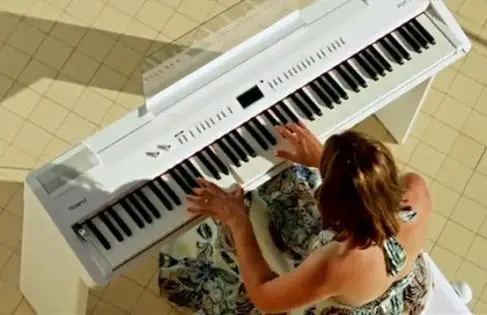
The more expensive the instrument, the better is the sound and the craftsmanship. The higher priced digital pianos use better sound samples and have better built-in speakers. You need a piano/keyboad that sounds full and rich, espeially for providing a convincing background accompaniment.
Please note that some of the models do not come with built-in speakers. So you either hear the sounds on a pair of headphones or connect your digital piano to your home system or get external amplifiers.
The best digital pianos are able to replicate the sounds perfectly in all the registers, they are punchier in the bass and brighter in the higher registers.
However, this may not hold true in case of budget portable pianos.
Though all the piano models sound good from a distance, if you sit down and observe very carefully, you will find that some of the models in the lower price range have a slightly muddier sound in the bass region, some of the sounds in the uppermost octaves sound tinny.
This is not a matter of great concern if you are a beginner and considering the amount you pay, but if it is, then you will have to look for a slight expensive model.
In general, listen to the sounds of the pianos that you are considering and ask questions like:
- Does the piano sound realistic?
- Does the sound resonate and decay naturally?
- Do the bass notes sound clear and thumping?
- Do the high notes sound bright?
Besides a set of different piano sounds, you can also expect some guitar and string sounds in your Digital Piano. Of course, if you are willing to pay more you will get a lot of sounds and effects just as in an electronic keyboard.
More things to consider:
- Check if the accompaniments cover various music genres and music of different parts of the world.
- Check if you can add more styles/accompaniments.
- Also check if the built-in speakers are good…you may need external amplifiers if you are planning to do more of onstage performances.
Factors to Consider: Portable Keyboard Instruments
Want something more portable, with fewer keys? You will find a a lot of options there too (my be not with fully weighted keys).
However, you can get lot of 76-keys keyboards with semi-weighted keys, and lots of options in 61 keys. Read more on the various types of digital/electronic keyboards
While cost is definitely a factor when buying a keyboard instrument, there are more factors that you may want to consider when buying a digital piano or a keyboard, such as Cost, Number of keys, Key Action, Quality of Sound Maintenance, Portability, built-in Styles, Recording Capabilities, etc.
Also, if you are buying an expensive model, make sure that your instrument is upgradable so that it does not become obsolete in a short span of time (applicable mostly for arrangers, synthesizers & workstations, and even to some digital pianos).
Let us go through these factors in detail.
How Important is Portability?
Keyboards/Pianos come in 88, 76, 61, 49, 37, 25, even lesser keys.
Ideally, a 61 keys keyboard is the minimum you should look for as, it will allow you play a wide range of songs.
Smaller sized music keyboards (less than 61 keys) are commonly used by kids. Smaller sized controllers are used by those who are into Computer music recording.
However, if you are inclined towards classical music, then you should consider buying piano keyboard with 88 keys.
Here’s more on the number of keys available on keyboard instruments and the importance of portability.
Related: Best way to travel with a stage piano.
What is the Cost
Now, this is relative and depends on your budget. If you are an absolute beginner, you can buy a budget portable piano for around five hundred dollars and start learning for some time, before upgrading to a better quality digital piano.
There are some who start learning on electronic keyboards, there are some who buy a digital piano to take music lessons. However, this is your choice and depends on your requirements, how much money you have to spend, whether you’re a beginner, or playing after a long break.
The good thing is that there are a lot of good-quality beginner keyboards available on the market. If budget is a constraint (for those looking for a high-end model), you will need to do some thinking, maybe buy a used one or cut on certain features that are not necessary for you.
If the budget is NOT a constraint, go for a model with many features. You will find several digital piano reviews here to help you select the best digital piano.
Touch / Velocity Response Keys
On keyboards with touch response keys, the sound produced will be sensitive to your touch. If you press the keys lightly the sound will be soft, if you press it hard the sound will be loud.
You will need this feature if you are seriously learning to play keyboards.
Almost all the standard size 61 key electronic keyboards nowadays have this feature but just make sure it is there. Mini-keyboards and toy pianos do not have touch sensitive keys.
Read more on Touch-sensitive (velocity-sensitive) keys in keyboards/pianos
Is It Expandable / Upgradeable?
Being an electronic instrument, digital keyboard instruments run the risk of getting obsolete over a period of time. So this is an important factor to consider before buying a piano keyboard.
If you are an intermediate or advanced player, consider keyboards that can be upgraded with the latest sounds and styles just to make sure it does not become obsolete.
Check if your electric keyboard supports USB or SmartCard for loading and saving songs & styles?
Electronic Keyboard manufacturers are now incorporating all the upgradeable features (found in Computers) to electronic keyboards and Digital Pianos as well.
How is the Layout / User Interface?
If you are a performer or if you do studio work, it is important for you to be able to locate all the features quickly and easily.
Having numerous knobs and sliders is a good thing (though it looks daunting at first) because you don’t have to depend on the LCD display to apply the various features.
Nonetheless, a good and easy-to-use user interface will always come in handy. A well-lit display will also help you to perform on-stage, especially if it is dark up there.
Music Production: Hardware or Software?
If you are an intermediate to advanced keyboard / piano player then you would already be dabbling a lot with composing stuff, trying to create your own music.
You will need to ask yourself if you are comfortable doing recording / editing work on your keyboard or on your computer.
If you are more comfortable with software and computers, then you just need a midi keyboard. Just save your money to spend on upgrading your computer, buying a good software sequencer, plugins, and sound samples.
If you are comfortable working with keyboards for all your sound and editing needs, then you will need to consider buying a high-end synthesizer or keyboard workstation. For gigs, you will need 88-key keyboards with features that will aid in ‘live playing’ (lots of knobs, buttons, easy to switch between things).
Sequencing & Mixing Features
Most of the musical keyboards have built-in sequencers so that you can practice composing, arranging and recording your own music.
But if you are serious about recording and mixing then you need to consider whether you want to do this on your keyboard or a computer.
If you already have a computer and have used software sequencers for recording, then you can probably save cost by having limited sequencing features on your keyboard instruments (when you buy one).
But if you do not have a computer and wish to do some serious recording and mixing on a keyboard, consider buying a good synthesizer or a workstation.
Sequencing & Mixing Features
Most of the musical keyboards have built-in sequencers so that you can practice composing, arranging and recording your own music.
But if you are serious about recording and mixing then you need to consider whether you want to do this on your keyboard or a computer.
If you already have a computer and have used software sequencers for recording, then you can probably save cost by having limited sequencing features on your keyboard instruments (when you buy one).
But if you do not have a computer and wish to do some serious recording and mixing on a keyboard, consider buying a good synthesizer or a workstation.
Is It Built for the Road?
If you are a performing artist, you will have to consider the issue of portability, and also check if it is ruggedly built.
Since you will be traveling a lot, you will need to consider factors like the weight of the keyboard, provide better protection by buying high-quality keyboard cases and sturdy stands so that it adequately supports your keyboard onstage.
For top of the range models, also consider insuring your gear.
Additional Features
Here are some other features that can be useful to have in your 61 key keyboard. So check if the music keyboard has what you need.
- Does the keyboard support external storage like USB or Smartcard…so that you can load and save songs and styles?
- Is the keyboard’s sound good enough for you or will you need a Keyboard Amplifier?
- Almost every keyboard comes with a built-in sequencer nowadays. You need to check how many tracks does it support? Do you need a 2-track recorder, 5-track recorder or more?
- Is the display big enough, well lit and easy to read? Is it easy to locate the various functions on the display? Can you easily activate them?
The Digital piano is also going the electronic keyboard way in the sense that you can get all those styles, effects, sequencer, layer and split functionality, USB, MIDI and expandable features in your Digital Piano. Though MIDI and a set of basic piano sounds are provided in all the models, you will have to pay more for the models with built-in musical styles, effects and the other features. If it is not extending your budget by much, go in for a model with musical styles. You will definitely enjoy the experience of playing your digital piano keyboard along with the musical accompaniments.
You get 88-key keyboards for gigging musicians that have several features that makes it easier to perform live.
The latest trend in digital pianos is the learning app that integrates your tablet/smartphone with the piano. These learning apps make learning easy and extends the capabilities of your digital piano. This feature however is not available on the budget pianos.
Digital upright/grand pianos nowadays are all-in-one entertainment systems that let you enjoy the benefits of digital technology. Top player pianos come with a remote control that let you play your favorite song using the built-in player, which then automatically starts playing the keys (you do not have to physically sit at the piano).
Infographic: Buying a Digital Piano Keyboard
There’s a lot of information available on buying digital pianos and keyboards, much of it exists on this site itself. If you want something concise, something that gives the important information in a nutshell, here it is.
Checkout this infographic.
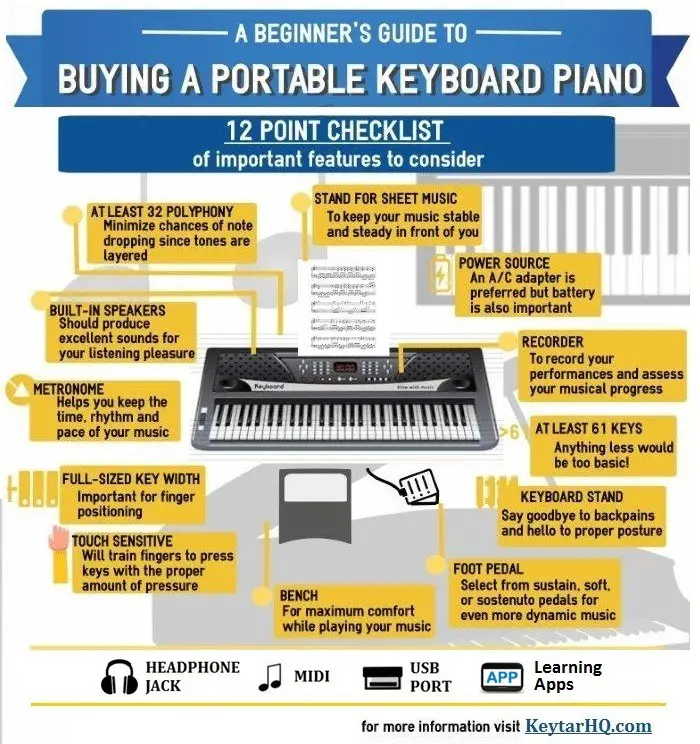
Professional Keyboards / Stage Pianos
Sstage pianos are cutting edge keyboards meant for professionals. Most of these come with synth action (very light action), though some models are available with weighted keys. These keyboards may or may not come with built-in speakers.
There are several synth keyboards that come with 73/76 keys. Gigging musicians looking for a more compact alternative to an acoustic piano can opt for stage pianos – portable 88-key digital pianos. You can choose a Stage Piano with either weighted, hammer or graded hammer action! These are considerably lightweight, so a good option if you intend to gig around.
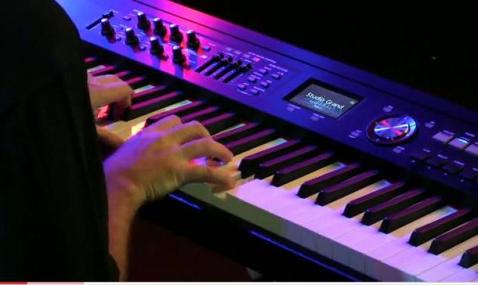
A stage piano with lots of buttons/sliders that helps during live performances
A synth keyboard (or stage piano) is a performance keyboard (used by professionals). So its going to have:
- Usually don’t have built-in speakers as they are usually played trough monitors, external amplifiers or PA systems (you can use use headphones though). Removing the speakers reduces the weight (huge advantage) & the cost (to some extent)
- The best sounds possible
- Intuitive interface
- Lots of knobs & buttons to quickly make the various selections/adjustments
- Its going to be built like a tank, very rugged (but lighter than an upright piano)
- It may not be elegant but the features are going to be cutting-edge.
- You need to buy pedals separately
- Its going to be expensive
- Pro musicians may also use a workstation keyboard, which in addition to the features of a stage piano, comes with programmable synthesizers, serious audio editing features, multi-track recorders/sequencers, and in some cases audio interfaces as well…basically an all-in-one studio.
Portable Pianos and Home Digital Piano: Which is Better?
Portable digital pianos are sort of extension of electronic keyboards and come with 73/76 keys or 88 keys; many of these have synth action (very light action) key-bed or semi-weighted keys that are perfect for keyboard players who are not accustomed to playing with hard keys but need more than 61 keys.
These models normally contain numerous musical styles, sounds and effects.
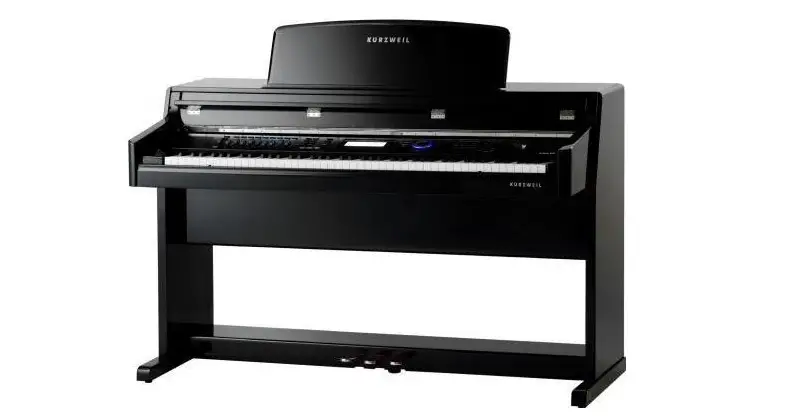
On the other hand, a (home) digital piano caters to a different audience. Its going to be:
- More affordable option to an acoustic piano. These come with built-in speakers which are good enough for personal use
- These usually come with integrated pedals, just like those on a real piano.
- The better ones can be a good piece of furniture and complement the looks of your room
- It will usually be in an upright or a grand piano design
You will find piano keyboard models targeted towards beginners, as well as towards professional pianists.
Beginner models come with basic piano sounds and a few other sounds like electric piano, organ, and strings. Some models come with more sounds and musical styles. Further, you will have varieties in looks, colors, sizes, key actions and other features. You can consider these models if you are a
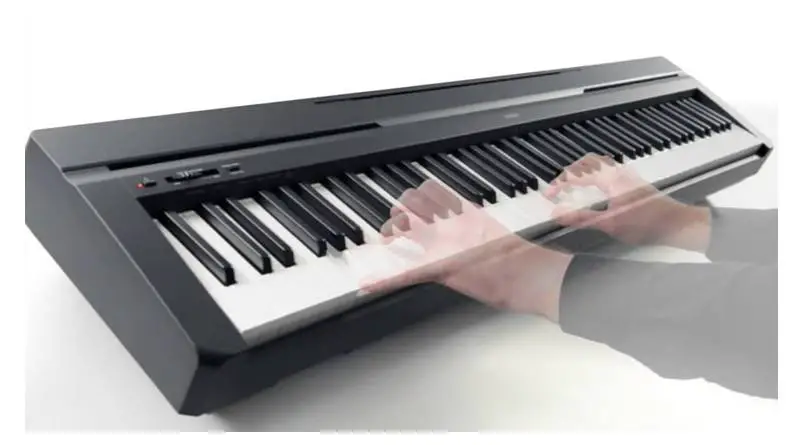
A portable piano commonly used for learning and/or practicing
So, you get portable pianos with weighted keys (these need to be placed on a stand); these are inexpensive and apt for beginners.
You get digital home pianos (upright or grand piano design) that can be used by beginners as well as experienced players.
You also get portable stage pianos for gigging.
More Things to Consider (Especially for Digital Pianos)
Buying your first digital piano: Digital pianos today are a viable and affordable alternative to acoustic pianos. These are portable, don’t require tuning or maintenance, and you can play/learn without disturbing others (using headphones). Here’s everything you need to know in order to buy your first digital piano.
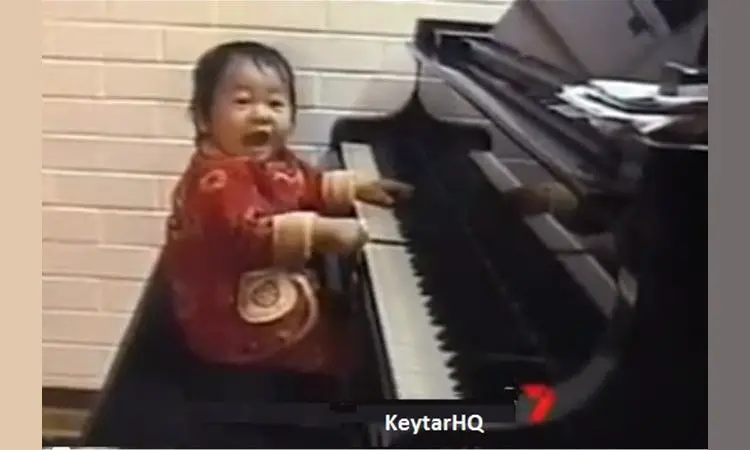
Factors to Consider
- Every digital piano has different features: number of keys, key sensitivity, key touch, polyphony, availability of built-in speakers (and its quality), dimensions of the piano & its weight, music creation tools, computer access, warranty, and more.
- How is the tone of the instrument? In general, the more expensive the instrument, the better the sounds. Also, in terms of features, do you want select features or fully loaded instrument.
- Action of the instrument: You want unweighted, semi-weighted or fully weighted keyboard instrument. Most brands have their own terms for weighted action. Yamaha use GHS/GH/GH3, Casio calls it scaled hammer action. Roland & Korg have their own terms. As a rule, the more expensive ones will have more realistic touch.
- Keep your current piano skills in mind & where you would like to go with your piano playing, and choose a piano accordingly.
- Everybody has their own preferences (soft corner) for certain brands/models; happens if you have been playing them for years. so don’t let that affect your judgment.
- Choose your desired finish: You want portable or one that looks like a real piano that matches the dcor of your house/apartment.
- Every digital piano sounds & feels a bit different, so you really don’t have to agree with others (beyond a certain point).
When buying musical instruments online, most of the user comments are from beginners or players who have only been playing for a couple of years or so. So you’ll find numerous comments where the buyer of a 400-500 bucks keyboard instrument would make statements such as “It’s better than most $3000+ digital pianos” and so on.
Now there’s no doubt that digital pianos are becoming cheaper and offer better quality, but in no way can a 400 dollar piano compare with a something that is priced 8 to 10 times more. So when reading comments, you’ve to take such statements with a pinch of salt.
And even though an entry level piano instrument may sound good, you need to ask questions such as:
- Does it sound good across all the octaves?
- How is the piano action?
- How are the other instrument tones? Do they sound realistic or only the piano sounds are good?
- How much is the polyphony?
- How many track-sequencer does it provide?
- Does it have built-in speakers, and a lot more
- One also has to consider the aesthetics of the piano.
Be Practical With Your Selection
You will find a wide range of keyboard instruments – some are used by world-class performers, some digital keyboards are used for full-fledged music production, some can be easily carried in a backpack (for those with a mobile studio), and some are suited for learning.
With Digital piano keyboards, every few years you see a totally new set of models with newer features. Besides, an electronic piano keyboard can cost anywhere from a couple of hundred dollars to a couple of thousand dollars.
So if you are just starting out as a beginner, go in for something basic and just concentrate on learning for some time. As you spend more time learning, you will know more about the various digital piano keyboard brands, various models, the kind of music you like to play, and your music-related interests.
A beginner who is not sure if he wants to learn play the keyboards or piano should probably get a 61 key electronic keyboard and get started, instead of buying an expensive piano with weighted keys; you rather enjoy the various voices and the built-in rhythms and focus on learning to play.
Similarly, if you are not a performer, but are happy belting out tunes on your computer, a simple midi keyboard controller may suffice for you.
If you are a beginner, look for a model which is not very expensive, you can even cut down on a few accessories such as the headphones or the stand.
Learning to play the keyboard/piano takes time so start on something economical, and then upgrade when you become good at it.
Remember, newer models are released every couple of years so you can pick up one of the latest ones when you are ready to upgrade.
You should also consider buying a pre-owned keyboard instrument (in case you find a good one), or buy a new one from your local outlet where you can try out various models, or on the Internet for better prices.
Here are some more indicators to help you determine whether a digital piano or a portable keyboard will suit your needs better:
- your inclination towards technology
- your liking for a particular style of music
- your budget
- whether you have learnt before
- what kind of keyboard player you are or want to become

Should You Buy a Piano?
If you are a person who likes the piano because:
- You like its beautiful piano sounds
- You like its great looks
- You are just content with playing the music you like on the piano (classical, jazz, blues etc.) without being bothered if there are hundreds of effects or other instrument sounds
This indicates that you should be buying piano. If your interests are mostly geared towards piano, then a Digital Piano is your choice.
A digital piano can be a cost effective solution to your need, and some of the electric piano models will also give you all the arranging features which you may start using later on.
Should You Buy an Arranger Keyboard?
On the other hand:
- You are a beginner who wants to take his first step towards playing
- You are excited by the various sounds, styles, and effects which a keyboard offers
- You want to play with a group of friends or for a band
- You like creating your own music, and arranging it
This indicates that you should be buying keyboard – a musical keyboard or a synthesizer workstation.
For onstage performances or using backing tracks, learning to play, or for songwriting, an Arranger Keyboard will be a better instrument and will serve you well.
Music keyboards are usually very affordable and that is why most use it, to begin with, to learn to play keyboards/piano. But then the piano sounds on a cheap keyboard are just about okay, not really close to any good quality piano. However, keyboards are a lot cheaper, serves the purpose for beginners, and that’s why they are so popular.
Music keyboards, also known as arranger keyboards can be of various types with the better ones known as arranger workstation that are loaded with several features. Any keyboardist looking for variety in their playing experience usually go for arranger workstations.
Some say that having a long list of features is actually a downside as you don’t actually use all the features. However, if you take some efforts to go through the various features, its actually quite fun to use them and they do help yo make the overall playing sound better. Fortunately, there are several forums also where you can find useful tips on how to use the music keyboard.
Those who prefer playing the piano can opt for one of the following:
- 76 or 88 key grand keyboards with arranger features. You may choose semi-synth style keys if you are used to playing keyboards
- 88 key digital piano with authentic weighted keys. You have options to choose a model with arranger features or you may choose one without all those extras
- If you are more into computer music production, you may consider an 88 key keyboard controller with weighted keys
- For those, who intend to perform, some cool synth pianos with cutting edge features are available.
There are several things that you would need to bear in mind when you look for a new keyboard instruments, depending on your budget, skills and intended use.
For most beginners it would be either a piano or a keyboard at an affordable price. For intermediate and experienced players the instrument will need specific features depending on whether the board is going to be used for performance or in the studio.
In any case, you are encouraged to get a feel of all shortlisted piano keyboards by visiting a local store.
- Go and lay your hands on every piano keyboard that fits in your budget.
- Play the keys and check if you are comfortable with the feel (more for the piano guys)
- If you have never owned an arranger before, ask for a demo of all the important functions, if that’s what you’re interest in.
- Always keep an eye for bundled packages. You may get some surprise piano accessories.
Closing Thoughts
To sum it up, the various factors that you need to consider before buying digital keyboard instrument includes things such as cost, your skill-levels, musical objectives and features such as number of keys, key action, sounds, styles, recording capabilities, etc.
.Consumers today are spolit for choices; there are various types of keyboard instruments available from various brands and it is easy to get confused. The questions listed above should help you clear up a lot of doubts in your mind.
Whether you are a beginner who wants to learn to play the piano in the traditional manner, whether you are an experienced piano player who loves to play the classical piano and loves to do the occasional gigs as well, your choice of piano keyboards is going to differ.
Every keyboard-instrument is built for a purpose so it is important to focus on your style of piano playing and be clear about the purpose of buying the digital piano keyboard.
KeytarHQ editorial team includes musicians who write and review products for pianists, keyboardists, guitarists & other musicians. KeytarHQ is the best online resource for information on keyboards, pianos, synths, keytars, guitars and music gear for musicians of all abilities, ages and interests.



The three types of pianos for consumers:
Digital pianos and electronic keyboards. These are compact and requires no maintenance. The sound is produced electronically. You can play different instrument sounds, including flute and guitars.
Vertical Pianos (Upright): In these acoustic pianos, the strings are positioned in a vertical manner and these are usually taller than grand pianos. These are commonly found in churches, schools, and homes.
Grand Pianos
The biggest of all the pianos. Grand pianos are commonly used for concerts and solo performances. Longer strings and larger soundboard produce rich sounds with greater resonance. You also have the option of going in for a baby grand.
Vertical and grand pianos are available in digital versions as well.